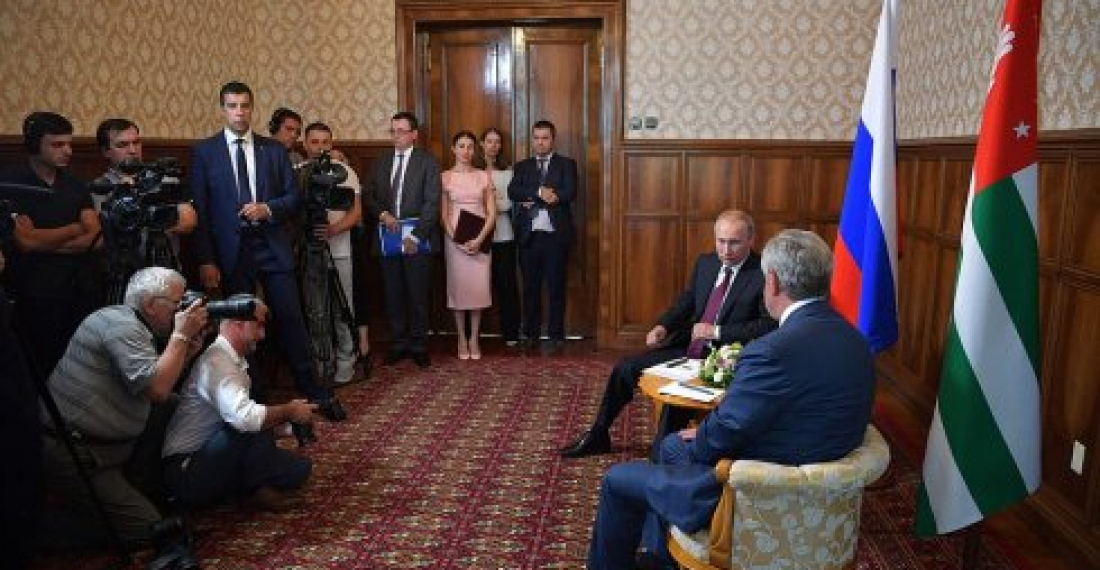There has been criticism from western countries following this week's visit by Russia's President Putin to Abkhazia. The visit coincided with the 9th anniversary of the August 2008 Georgia-Russia War and was strongly condemned by the Georgian government.
International reaction to the visit has also been negative. In Washington the State Department issued a statement through its spokesperson:
"The United States views the visit of President Putin to the Russian occupied Georgian territory of Abkhazia as inappropriate and inconsistent with the principles underlying the Geneva International Discussions, to which Russia is a party. The United States fully supports Georgia's sovereignty and territorial integrity within its internationally recognized borders and rejects Russia's recognition of Abkhazia and South Ossetia. The United States urges Russia to withdraw its forces to pre-war positions per the 2008 ceasefire agreement and reverse its recognition of the Georgian regions of Abkhazia and South Ossetia."
A statement was also issued by the Delegation of the European Union to Georgia. It says:
"The visit of the President of the Russian Federation to Georgia's breakaway region of Abkhazia on the day of the anniversary of the August 2008 war, like similar visits before it, infringes upon the principle of Georgia's territorial integrity and risks jeopardising international efforts directed at the peaceful resolution of the conflict. The Delegation recalls the firm support of the European Union for Georgia's sovereignty and territorial integrity within its internationally recognized borders."
The criticism has however been dismissed by the Abkhaz authorities
In a statement, the Foreign Ministry of the self-declared Republic of Abkhazia described the Georgian top officials' response to Russian President Vladimir Putin’s visit to Abkhazia on August 8 as "pretty nervous", TASS news agency reports from Sukhumi.
The Abkhaz Statement adds
"The Abkhaz Foreign Ministry took note of the pretty nervous response to Russian President Vladimir Putin’s visit to Abkhazia by Georgian top officials. In spite of the numerous populist statements made by Georgian politicians and their Western sponsors, specifically, the US, the EU, NATO and other organizations, which predictably condemned Vladimir Putin’s visit to Abkhazia, we would like to assure all interested parties that the visit went off successfully, at a high interstate level, and the Abkhaz-Russian strategic cooperation will continue to develop dynamically."
"Unlike US Vice President Michael Pence’s visit to Georgia, which took place against the backdrop of NATO’s joint military exercises in Georgia, which began last week and which pose a real threat to security and stability in the South Caucasus, the Russian president’s visit to Abkhazia was exclusively peaceful and productive creating additional guarantees for Abkhazia’s safe and steady development."
"The Republic of Abkhazia is an independent sovereign country, which builds relations with its partners on its own, despite all attempts by Georgia and its Western partners to deny the existing political realities in the South Caucasus remaining hostages of their own illusions and distorted ideas."
With the exception of Russia and a handful of other countries the international community recognises Abkhazia as part of Georgia.
You can also read:
Commentary: The war that exposed Russia's bad intentions here
Putin commits on security and independence of Abkhazia during visit to the territory here
source: commonspace.eu
photo: President Putin talkling to journalist during his visit to Pitsunda in Abkhazia on Tuesday (9 August 2017), Picture courtesy of the press service of the president of Russia.






